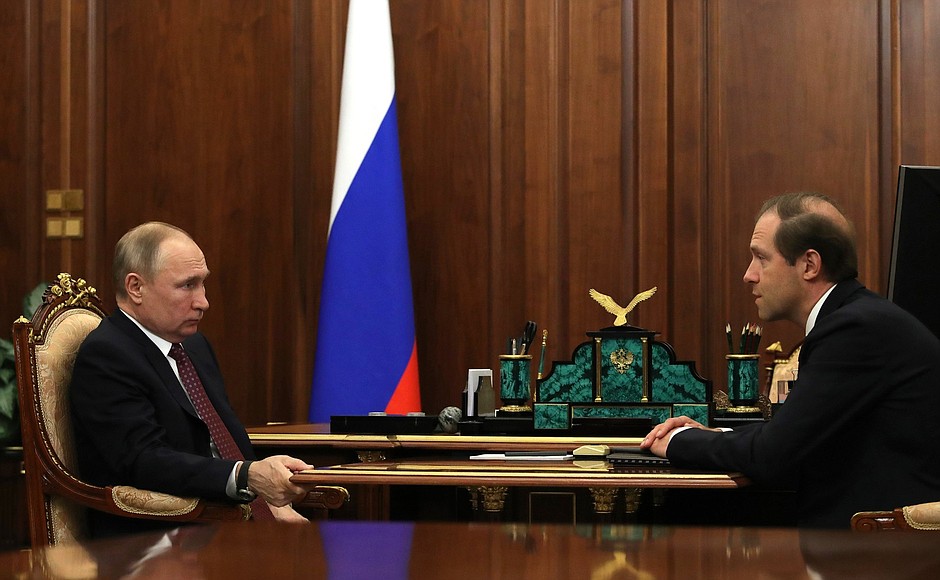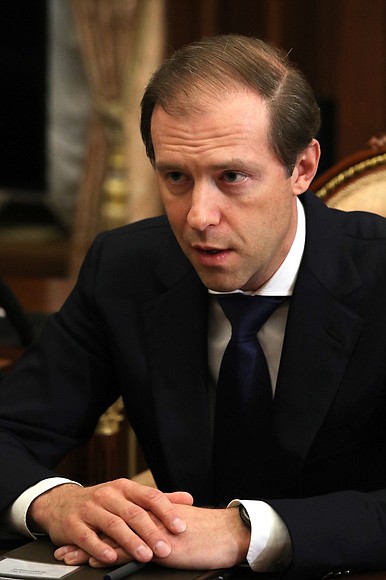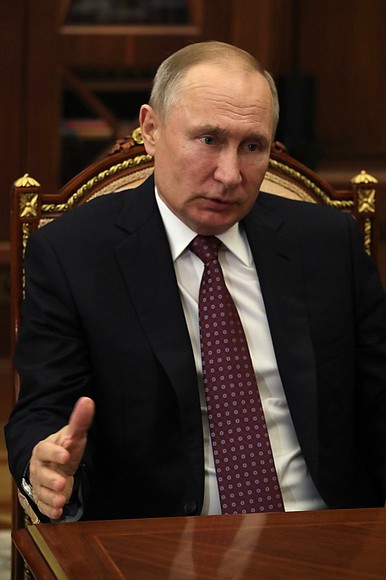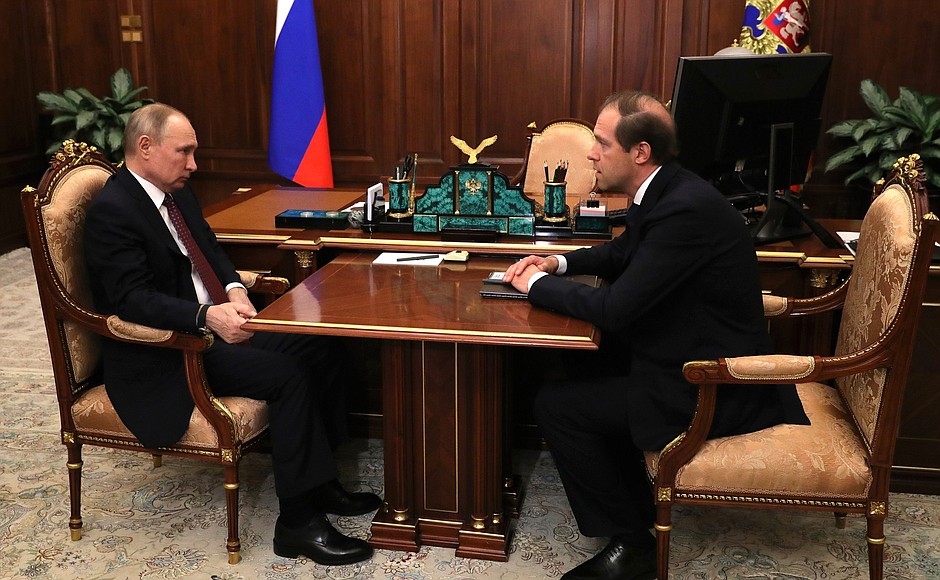President of Russia Vladimir Putin: Good afternoon, Mr Manturov.
Let us discuss two major matters.
First, how are the industry and trade faring during the fight against the coronavirus and with all the factors affecting the economy of many countries, including ours – Russia is no exception here.
In this connection, how is the industry working to meet the demand for protective items, such as things like disinfectant, as well as breathing equipment, that is, everything needed to ensure the smooth running of healthcare facilities and support for the people?
Minister of Industry and Trade Denis Manturov: Mr President, our industry simultaneously faces two challenges, including the matter of the coronavirus and substantial oil price reductions that have caused the ruble to plunge… This exerts a certain positive effect on some industries.
Vladimir Putin: For the export-oriented sectors.
Denis Manturov: Yes, on the one hand, this favourably influences export-oriented sectors. On the other hand, current prices on foreign markets, unfortunately, do not facilitate expanded sales of exchange goods. First of all, we are talking about metallurgy, chemistry, the pulp-and-paper industry and mineral fertilisers.
The overall situation is satisfactory: currency earnings and ruble expenses are balanced. The processing industries using foreign components have to quickly find other suppliers due to the changes in the logistics with some countries postponing supplies and some suspending them.
The industrial enterprises that have been actively implementing the import substitution plan for the last five years in line with your instructions, have already implemented 460 of the 970 projects in 23 industries; they are already manufacturing goods.
Mostly their products have higher quality and indicators than their foreign analogues. There are a lot of examples, including agricultural machine building: the share of Russian producers is more than 50 percent of the market; the same goes for helicopter building, chemistry and the wood processing complex.
There are industries where this share is less than 50 percent, where we still have to work on import substitution: another 240 projects will launch serial production in the next two years. On the one hand, this makes it possible to export some of the products.
The International Cooperation and Exports national project is being implemented. It has enough support tools to ensure its regularity. And, of course, we hope that the national projects will also provide for the domestic demand.
In line with your instructions, we have made an inventory of all the national projects in general and determined the volume of industrial products that all the agencies are expected to purchase until 2024: six trillion.
We expect that about a half, three trillion’s worth, will be purchased from Russian manufacturers, which, of course, will encourage the enterprises to a certain degree and ensure that they are stably loaded, especially during this period of uncertainty.
As for the work on the task to combat the coronavirus, we have 18 companies that have primarily focused on making facemasks from synthetic non-woven material, and used to roll out on average about 600,000 masks per day.
That was generally enough for the healthcare system, for pharmacy chains, and even for export. But a month ago, we got all these plants to operate round-the-clock and their capacities increased to 1.6 million masks per day, and on March 2, we imposed a ban on exports.
Starting last week, they additionally launched the production of masks from Russian gauze. Gauze production is also expanding to 30 million linear metres per month, and we expect to reach three million masks in early April.
We additionally engaged a large number of light industry enterprises, which today are also operating in an emergency mode, around the clock. We expect a total of five million masks per day to be rolled out in the first half of April.
We primarily expect to supply the healthcare system, the pharmacy chains, and a number of services — the Federal Customs Service, border guards, the Ministry of the Interior — also need them to carry out their official work.
As for other goods – medical equipment, lung ventilators, thermal imagers, non-contact thermometers, and UHF irradiators for disinfecting rooms – we are now also maximising production in order to satisfy all the needs that the regions have today.
We have formed a crisis centre at the Ministry. We received an appropriate order from the Prime Minister and all the necessary powers to be able to consolidate all the designated resources and then, in accordance with the epidemiological situation in the regions, to send them to the regions as required.
The same concerns disinfectants. We are already manufacturing three million hand sanitisers and 350 million litres of disinfectant for disinfecting rooms and buildings.
Today, we can boost production of hand sanitisers three-fold; this task has been set, and we will accomplish it by early April.
Vladimir Putin: On the whole, the national industry is working at a good pace, but you have now named the most important elements of the work when it is important to exert maximum efforts for containing the possible spread of this infection.
Therefore, I strongly hope that you, your colleagues and industry representatives who realise this will do everything possible to provide all the necessary materials, devices and medical equipment to the people and to our special services and units that work directly with high-risk categories. I am talking about medical personnel, Emergencies Ministry employees, border, customs services, and so on, so that they would have everything necessary for organising their work.
I would like to ask you to report to me on a regular basis about expanded production volumes.
Denis Manturov: Certainly.
The Government has taken all the essential action for facilitating this work. The Industrial Development Fund has launched a special programme. The Government has allocated ten billion rubles’ worth of soft loans with one-percent annual interest for boosting circulating assets that will help expand production.
As you are aware, the Industrial Development Fund has always financed investment projects. A separate programme has been opened, and the Government has drafted other support measures and incentives today.
Vladimir Putin: Good.
<…>




